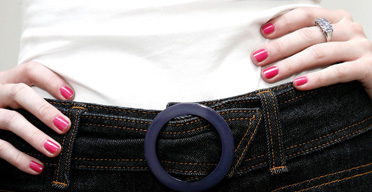
Models should provide medical certificates proving they are healthy and not suffering from an eating disorder before being allowed on the catwalk, an investigation into practices in the industry concluded today.
The Model Health Inquiry, which said it had found "startling" evidence about the vulnerability of young models in the fashion trade, also recommended better health education and possible random backstage drugs tests.
However, today's final report (pdf) - produced by a panel set up by the British Fashion Council in March after worries about excessively thin models at last year's London fashion week - stopped short of recommending minimum body mass index (BMI) measurements for models at the event.
Madrid's fashion week has adopted this approach, setting a minimum BMI limit of 18.5, below which doctors generally view people as being underweight.
Experts canvassed by the inquiry felt a strict measurement of BMI - which uses a ratio of height and weight to calculate healthy size - was a "blunt instrument" that could encourage models to "binge" before being checked and starve themselves afterwards, the panel said, whereas checks by a doctor would be more thorough.
The report, Fashioning a Healthy Future, made 14 recommendations which were not binding but would be left to the fashion industry to regulate.
They included an outright ban on models aged 16 and under at London fashion week and compulsory criminal records checks for photographers, agents and others working with under-16s. Models younger than 16 should also have chaperones, the report said.
"The facts of the modelling profession are not so glamorous," Lady Kingsmill, the former deputy chair of the Monopolies and Mergers Commission, who headed the panel, said in her introduction to the report.
"It is peopled by young and potentially vulnerable workers - the majority of them women - who are self-employed and do not have adequate support."
The summary of the panel, whose members also included the fashion designers Betty Jackson and Giles Deacon and the model Erin O'Connor, expressed grave concerns at the potential vulnerability of younger models.
"These remain a small proportion of the overall number of catwalk models but casting directors and models themselves reported a growing tendency to recruit under-16s in pursuit of the latest 'new look'," the report noted.
"Furthermore, the prepubescent bodies of under-16s conform to the skinniness sought by certain designers that cannot be matched by older models without drastic dieting."
While ruling against recommending a minimum BMI for London fashion week, the report said models should be obliged to provide a certificate from a doctor with expertise in recognising eating disorders, for which they would have to pay.
Any models taking part in London fashion week should be taken on through UK-based model agencies to ensure the necessary checks had been carried out, it said.
Programmes of health education and awareness should also be set up "as a matter of urgency", the panel said, warning that ignorance on such issues was rife.
"Our investigations uncovered a deep lack of knowledge about eating disorders in the fashion industry, including among models," the summary noted. "Few model agents questioned during the course of the inquiry reported experience of cases of eating disorders."
Up to 40% of models could have some form of eating disorder, according to the inquiry's estimates.
Additionally, London fashion week should provide a "healthy backstage environment", including the possible introduction of random drug tests.
Other recommendations included urging magazines and other publishers not to digitally manipulate photographs of models, a practice the report said could "perpetuate an unachievable aesthetic".
Hilary Riva, the chief executive of the British Fashion Council, which owns and runs London fashion week, said some of the recommendations had already been adopted while others "will take time, and further funding, to develop".
The council had "specifically asked" the inquiry to look into whether BMI limits were appropriate.
"The inquiry did not support the introduction of a 'weigh-in' system through BMI testing due to the risk that it may worsen eating disorders among models and would be both demeaning and discriminatory to our industry," she said.
"We agree with this assessment and the introduction of medical certificates, and subsequent monitoring will better support the general healthiness of models appearing on the catwalk."

